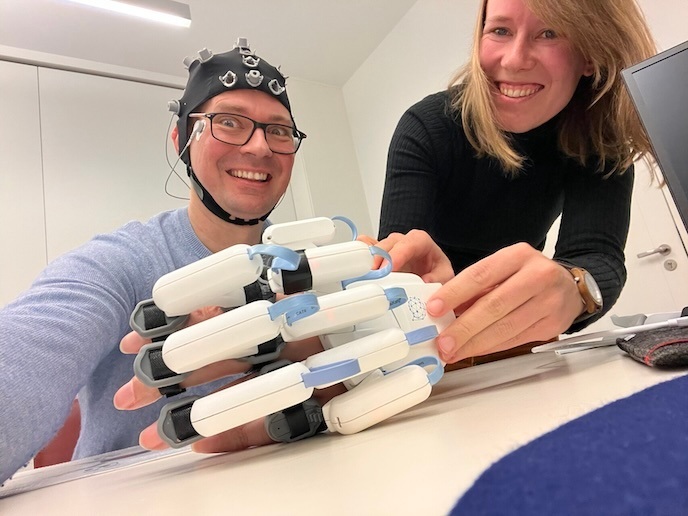Adaptive neurotech aims to restore body and brain functions
Brain/neural-machine interfaces (B/NMIs) convert brain activity into signals, allowing users to control external devices with their thoughts. These devices help people living with conditions such as paralysis, stroke or dementia – restoring movement, communication and/or cognitive function. Unfortunately, the non-invasive (avoiding brain implants) B/NMIs currently available lack the versatility required, due to limited signal quality. “Moreover, they typically only read out brain activity but don’t directly ‘write in’ or modulate it, because that stimulation interferes with brain signal recordings. This capacity is critical to restoring or complementing sensory feedback for learning and precise neuroprosthetic control,” explains Surjo Soekadar, coordinator of the NGBMI project, which was funded by the European Research Council (ERC). To overcome these limitations, NGBMI has combined B/NMIs with transcranial magnetic stimulation (TMS) and transcranial electric stimulation (TES) systems.
Adaptive stimulation based on brain activity
The groundwork for NGBMI had actually been laid by work previously undertaken by Soekadar and colleagues, demonstrating for the first time that brain oscillations can be measured during TES. This had involved developing a B/NMI-controlled hand exoskeleton, for a person with quadriplegia to regain the mobility needed for daily activities. NGBMI successfully developed a mobile system that integrates B/NMIs with TES, allowing real-time adaptive stimulation based on brain activity. The system consists of an electrode cap and wireless signal amplifier connected to a tablet computer, running real-time signal processing software that drives external devices, such as exoskeletons or robots, while adjusting TES to the ongoing brain activity. First tested in healthy individuals, the system was transferred to patients with neuropsychiatric and neurological disorders, such as depression, dementia and stroke, focused specifically on tackling impaired motor or cognitive function. “We demonstrated the selective enhancement or suppression of specific brain oscillations, effectively modulating related behaviours, symptoms or functions such as working memory,” says Soekadar from Charité – University of Medicine, Berlin. For example, the team selectively enhanced fronto-parietal alpha oscillations, improving participants’ ability to memorise images, offering a potential treatment for neurodegenerative disorders, such as Alzheimer’s. Since conventional TMS and TES have limited spatial precision and penetration depth, a novel stimulation principle called temporal interference magnetic stimulation (TIMS) was also developed. Thanks to an ERC Proof of Concept grant and supported by the SPARK BIH programme, a patent for the device was filed and is now being licensed to eemagine Medical Imaging Solutions and ANT Neuro, both leading EU-based neurotech companies with global reach.
Empowering technology for better clinical outcomes
NGBMI’s use of technology to restore body and brain functions, ultimately empowering individuals, aligns well with EU policies on digital health, assistive technology and neurorehabilitation. Potential applications include home-based neuromodulation for depression, cognitive enhancement in dementia and neurorehabilitation for stroke patients, improving quality of life and reducing healthcare costs. “As a psychiatrist, my goal was to develop a non-invasive approach that, over time, makes itself redundant by ‘training’ the central nervous system,” adds Soekadar. “But we must remember that while neurotechnological interventions can modulate symptoms, they alone cannot resolve the root causes of mental disorders.” The team is currently preparing for large-scale clinical trials, while also pursuing regulatory approval for TIMS and commercialising the brain/neural exoskeleton for stroke rehabilitation. Next, the plan is to integrate the TIMS approach with quantum sensors, to develop a bidirectional quantum brain-computer interface. As quantum sensors give more precise brain activity recordings, this could enable more accurate neural decoding and targeted neuromodulation, enhancing neurorehabilitation, cognition and assistance. The team will also explore AI-driven optimisation to further enhance the long-term efficacy of advanced neuromodulation solutions.
Keywords
NGBMI, neurotech, brain, neural, interface, dementia, assistive technology, quantum, mental health, mobility



